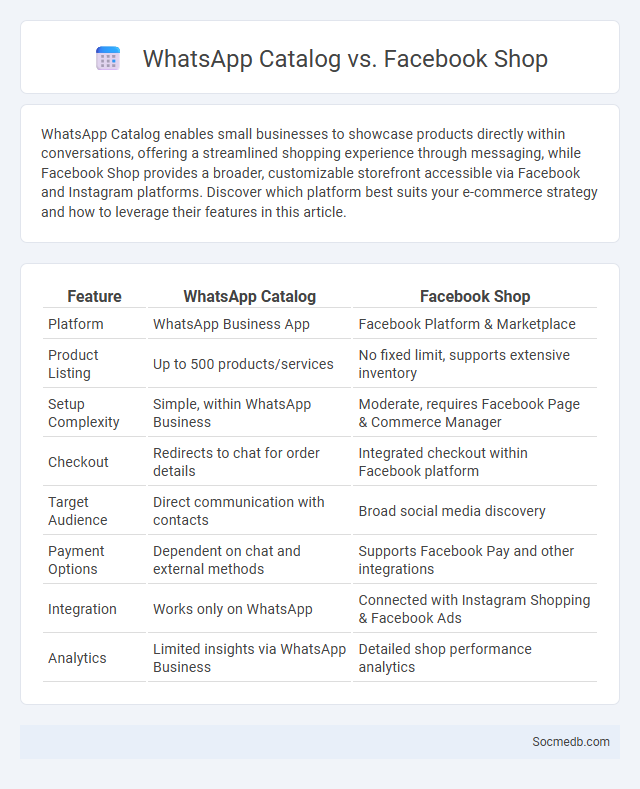
Photo illustration: WhatsApp Catalog vs Facebook Shop
WhatsApp Catalog enables small businesses to showcase products directly within conversations, offering a streamlined shopping experience through messaging, while Facebook Shop provides a broader, customizable storefront accessible via Facebook and Instagram platforms. Discover which platform best suits your e-commerce strategy and how to leverage their features in this article.
Table of Comparison
| Feature | WhatsApp Catalog | Facebook Shop |
|---|---|---|
| Platform | WhatsApp Business App | Facebook Platform & Marketplace |
| Product Listing | Up to 500 products/services | No fixed limit, supports extensive inventory |
| Setup Complexity | Simple, within WhatsApp Business | Moderate, requires Facebook Page & Commerce Manager |
| Checkout | Redirects to chat for order details | Integrated checkout within Facebook platform |
| Target Audience | Direct communication with contacts | Broad social media discovery |
| Payment Options | Dependent on chat and external methods | Supports Facebook Pay and other integrations |
| Integration | Works only on WhatsApp | Connected with Instagram Shopping & Facebook Ads |
| Analytics | Limited insights via WhatsApp Business | Detailed shop performance analytics |
Overview: Understanding Digital Catalogs in E-Commerce
Digital catalogs in e-commerce serve as comprehensive online product listings that enable businesses to showcase their inventory with detailed descriptions, images, and pricing. These catalogs improve user experience by offering searchable categories, filters, and real-time updates, facilitating efficient customer decision-making. Integration with social media platforms enhances visibility and drives targeted traffic, leading to increased sales and brand engagement.
What is WhatsApp Catalog?
WhatsApp Catalog is a feature that allows businesses to showcase their products or services directly within the WhatsApp app, creating a convenient and visually appealing shopping experience. Your customers can browse item images, descriptions, and prices without leaving the chat, streamlining the buying process. This tool enhances customer engagement and simplifies product discovery on one of the world's most popular messaging platforms.
What is Facebook Shop?
Facebook Shop is an e-commerce feature that allows businesses to create an online storefront directly on Facebook and Instagram, enabling seamless shopping experiences for users. It integrates product catalogs, enables direct purchasing via the platform, and supports customization to match a brand's identity. By setting up a Facebook Shop, your business can reach millions of potential customers with streamlined product discovery and easy checkout options.
What is a Traditional Online Catalog?
A traditional online catalog is a digital collection of products or services organized for easy browsing and shopping, similar to printed catalogs but accessible via websites. It typically includes detailed descriptions, images, prices, and item specifications to help Your purchasing decisions. These catalogs serve as a foundational tool for e-commerce and social media marketing by providing structured product information to attract and convert customers.
Key Features Comparison: WhatsApp Catalog vs Facebook Shop vs Catalog
WhatsApp Catalog, Facebook Shop, and Facebook Catalog offer distinct features tailored to different business needs. WhatsApp Catalog enables you to showcase up to 500 products directly within chats, facilitating seamless customer interaction and quick purchase decisions. Facebook Shop integrates with Facebook Catalog to provide a customizable storefront on Facebook and Instagram, supporting advanced inventory management, product tagging, and dynamic ads to boost your brand's online presence.
User Experience and Interface Differences
Social media platforms vary significantly in User Experience (UX) and Interface (UI) design, impacting how You interact and engage with content. Platforms like Instagram prioritize visual storytelling with minimalist, image-focused interfaces, while Twitter emphasizes real-time text updates through a more straightforward, timeline-based layout. Understanding these differences helps optimize Your social media strategy by aligning content with the platform's unique UX/UI to enhance engagement and user satisfaction.
Integration with Social Media Platforms
Seamless integration with social media platforms enhances your brand visibility by connecting content directly to channels like Facebook, Instagram, and Twitter. Utilizing APIs and plugins allows automated sharing, targeted advertising, and real-time engagement tracking, ensuring consistent messaging across networks. This integration boosts user interaction, drives traffic, and optimizes your digital marketing strategy for maximum online impact.
Payment and Checkout Options
Social media platforms increasingly integrate diverse payment and checkout options to streamline your shopping experience, including native wallets, buy buttons, and third-party payment gateways. Features like Instagram Checkout and Facebook Shops enable seamless transactions without leaving the app, enhancing convenience and boosting conversion rates. Optimizing these payment methods ensures security, speed, and multiple currency support, directly influencing customer satisfaction and sales performance.
Best Use Cases for Each Platform
Facebook excels in community building and targeted advertising, making it ideal for businesses aiming to engage specific demographics and leverage detailed user analytics. Instagram's visual-centric platform is perfect for brand storytelling, influencer marketing, and showcasing lifestyle products through high-quality images and short videos. LinkedIn offers unparalleled opportunities for professional networking, B2B marketing, and sharing industry insights, enabling companies to establish thought leadership and recruit talent effectively.
Choosing the Right Catalog Solution for Your Business
Selecting the right catalog solution for your business involves evaluating platforms that integrate seamlessly with social media channels like Instagram and Facebook Shops, enhancing product visibility and customer engagement. Opt for solutions that support dynamic product updates, rich media content, and analytics to optimize marketing strategies and drive sales. Prioritizing scalability and user-friendly interfaces ensures efficient management of your product catalog across multiple social media platforms.
 socmedb.com
socmedb.com